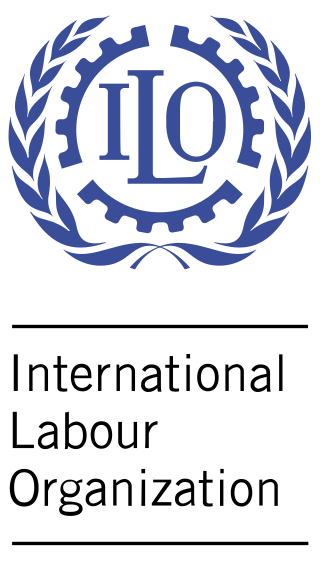
The International Labour Organization (ILO) is a United Nations agency whose mandate is to advance social and economic justice by setting international labour standards. Founded in October 1919 under the League of Nations, it is one of the first and oldest specialised agencies of the UN. The ILO has 187 member states: 186 out of 193 UN member states plus the Cook Islands. It is headquartered in Geneva, Switzerland, with around 40 field offices around the world, and employs some 3,381 staff across 107 nations, of whom 1,698 work in technical cooperation programmes and projects.

The United Nations System consists of the United Nations' six principal bodies, the Specialized Agencies and related organizations. The UN System includes subsidiary bodies such as the separately administered funds and programmes, research and training institutes, and other subsidiary entities. Some of these organizations predate the founding of the United Nations in 1945 and were inherited after the dissolution of the League of Nations.

Trafficking of children is a form of human trafficking and is defined by the United Nations as the "recruitment, transportation, transfer, harboring, and/or receipt" kidnapping of a child for the purpose of slavery, forced labour, and exploitation. This definition is substantially wider than the same document's definition of "trafficking in persons". Children may also be trafficked for adoption.

Decent work is employment that "respects the fundamental rights of the human person as well as the rights of workers in terms of conditions of work safety and remuneration. ... respect for the physical and mental integrity of the worker in the exercise of his/her employment."
The Japanese yen is the unit of currency in Japan.

A job guarantee is an economic policy proposal that aims to provide a sustainable solution to inflation and unemployment. Its aim is to create full employment and price stability by having the state promise to hire unemployed workers as an employer of last resort (ELR).
The International Organisation of Employers (IOE) was created in 1920 to advocate for employers and the business community in the tripartite governance structure of the International Labour Organization (ILO). Today, from its headquarters in Geneva, Switzerland, IOE continues to defend and promote these same interests across a wide range of UN agencies, international organisations, intergovernmental processes and the media. As of September 2019, IOE had 156 national employer organisations members in 145 countries. It remains involved in the activities of the International Labour Organization, acting as Secretariat to the Employers' Group, as well as representing business in international forums, including the G20 intergovernmental process on labour and social policy. It describes itself as "the largest network of the private sector in the world" and "the global voice of business".

Social protection, as defined by the United Nations Research Institute for Social Development, is concerned with preventing, managing, and overcoming situations that adversely affect people's well-being. Social protection consists of policies and programs designed to reduce poverty and vulnerability by promoting efficient labour markets, diminishing people's exposure to risks, and enhancing their capacity to manage economic and social risks, such as unemployment, exclusion, sickness, disability, and old age. It is one of the targets of the United Nations Sustainable Development Goal 10 aimed at promoting greater equality.
The United Nations Global Initiative to Fight Human Trafficking (UN.GIFT) is a multi-stakeholder initiative providing global access to expertise, knowledge and innovative partnerships to combat human trafficking.
The social protection floor (SPF) is the first level of protection in a national social protection system. It is a basic set of social rights derived from human right treaties, including access to essential services and social transfers, in cash or in kind, to guarantee economic security, food security, adequate nutrition and access to essential services.
The world's poor are significantly more likely to have or incur a disability within their lifetime compared to more financially privileged populations. The rate of disability within impoverished nations is notably higher than that found in more developed countries. Since the early 2010s there has been growing research in support of an association between disability and poverty and of a cycle by which poverty and disability are mutually reinforcing. Physical, cognitive, mental, emotional, sensory, or developmental impairments independently or in tandem with one another may increase one's likelihood of becoming impoverished, while living in poverty may increase one's potential of having or acquiring disability in some capacity.
Statistics on unemployment in India had traditionally been collected, compiled and disseminated once every ten years by the Ministry of Labour and Employment (MLE), primarily from sample studies conducted by the National Sample Survey Office. Other than these 5-year sample studies, India has – except since 2017 – never routinely collected monthly, quarterly or yearly nationwide employment and unemployment statistics. In 2016, Centre for Monitoring Indian Economy – a non-government entity based in Mumbai, started sampling and publishing monthly unemployment in India statistics.

The Secretary-General's Envoy on Youth serves as a global advocate for addressing the needs and rights of young people for bringing the United Nations closer to them. The Envoy's Office is part of the United Nations Secretariat and supports multi-stakeholder partnerships related to the United Nations system-wide action plan on youth to volunteer initiatives. The office also promotes the empowerment and foster the leadership of youth at the national, regional, and global levels, including through exploring and encourages mechanisms for young people’s participation in the work of the United Nations and in political and economic processes with a special focus on the most marginalized and vulnerable youth.

Armenia was admitted into the United Nations on 2 March 1992, following its independence from the Soviet Union. In December 1992, the UN opened its first office in Yerevan. Since then, Armenia has signed and ratified several international treaties. There are 20 specialized agencies, programs, and funds operating in the country under the supervision of the UN Resident Coordinator. Armenia strengthened its relations with the UN by cooperating with various UN agencies and bodies such as the International Monetary Fund, the World Bank, the World Food Programme, and with the financial institutions of the UN. Armenia is a candidate to preside as a non-permanent member of the UN Security Council in 2031.
Zohreh Tabatabai is an Iranian diplomat and international business coordinator. She served in the United Nations as chief of the "Focal Point for women for the United Nations system" and in the International Labour Organization (ILO) in Geneva as a senior member of the Director's Cabinet and as the Director of Communications. After her ILO assignment, Tabatabai established Quince Partners, an enterprise dealing with communications and public relations.

Unemployment in Turkey measured by the Office for National Statistics show unemployment in Turkey at 3 647 000 (12.7%) as of December 2017. Though unemployment is a general problem for the whole world, the degree of unemployment in Turkey is especially high in respect to the other countries in the region at the same economic level. In the year 2017, the data on "youth unemployment", which indicates unemployment between 15 and 25 according to the data of the Turkish Statistical Institute (TUİK), showed a worse performance than the general unemployment rate and increased by 4.8 percentage points to 24 percent.
Azerbaijan has been a member in the United Nations since March 2, 1992, after the UN General Assembly admitted Azerbaijan at its 46th session. The Permanent Mission of the Republic of Azerbaijan was opened in New York City in May 1992. On October 29, 1991, soon after gaining independence from the Soviet Union, Azerbaijan applied to the UN General Assembly for joining the organization. Azerbaijan was elected as a non-permanent member of the UN Security Council for the term of 2012–2013. Through the UN, Azerbaijan has reached out to the international community, especially Europe. Azerbaijan strengthened its relations with the UN by cooperating with UN agencies and bodies such as International Monetary Fund, the World Bank, the World Food Programme, and the financial institutions of the UN.
Youth in Africa constituted 19% of the global youth population in 2015, numbering 226 million. The United Nations defines youth as people aged 15 to 24 years. By 2030, it is predicted that the number of youths in Africa will have increased by 42%. Africa's population as a whole is very young, with 60% of the entire continent aged below 25, making it the youngest continent in the world, in relation to its population makeup. All of the world's top 10 youngest countries by median age are in Africa, with Niger in first place with a median age of 15.1 years. There is contention among critics and analysts over what this demographic dividend could mean for African nations; some believe that, with effective governance, the economy could significantly benefit and develop, whilst others have argued that a large, poorly-managed youth population may lead to greater instability and civil conflict.

Sustainable Development Goal 8 is about "decent work and economic growth" and is one of the 17 Sustainable Development Goals which were established by the United Nations General Assembly in 2015. The full title is to "Foster sustained, inclusive and sustainable economic growth, full and productive employment and decent work for all." Progress towards targets will be measured, monitored and evaluated by 17 indicators.









